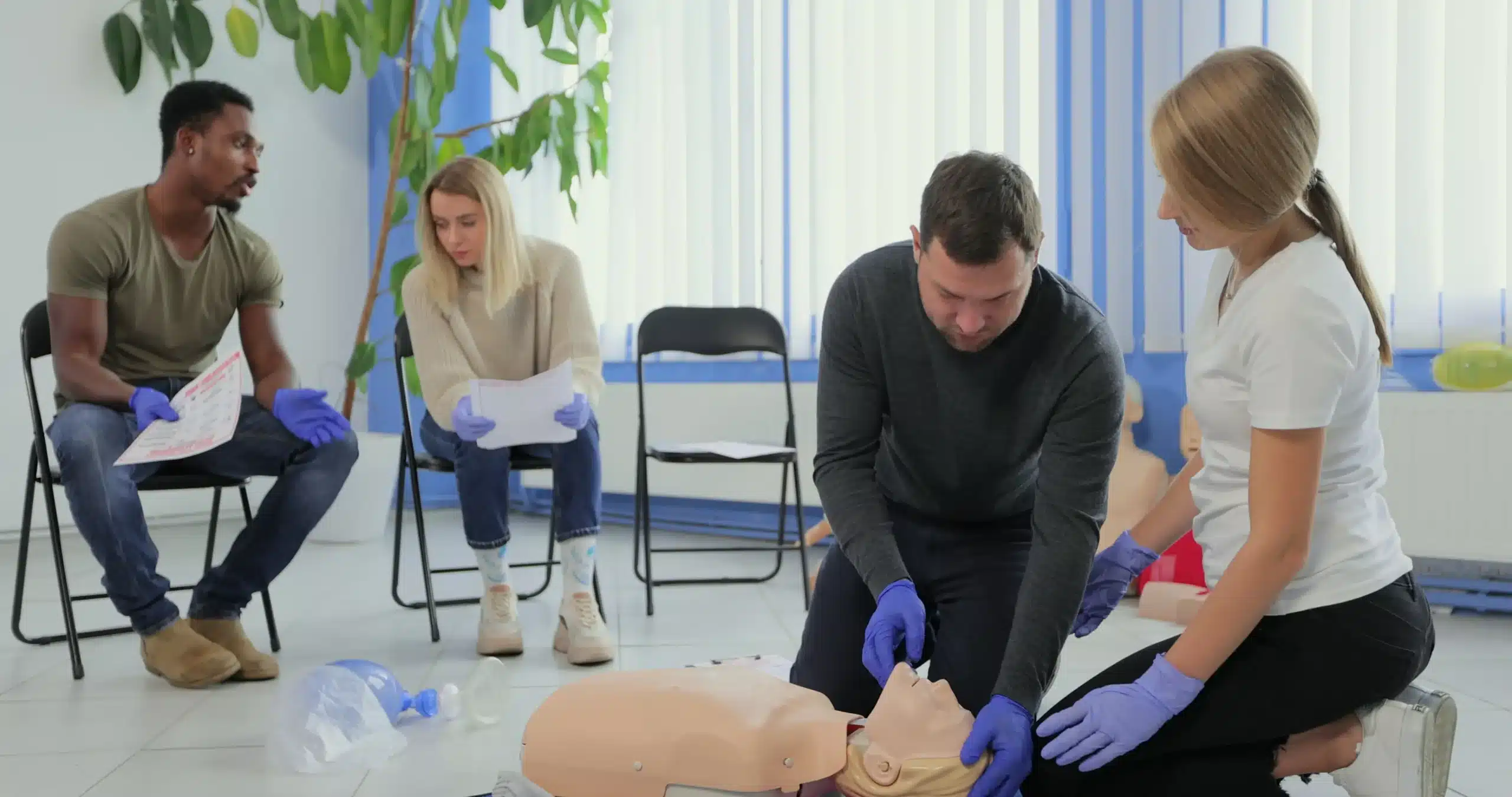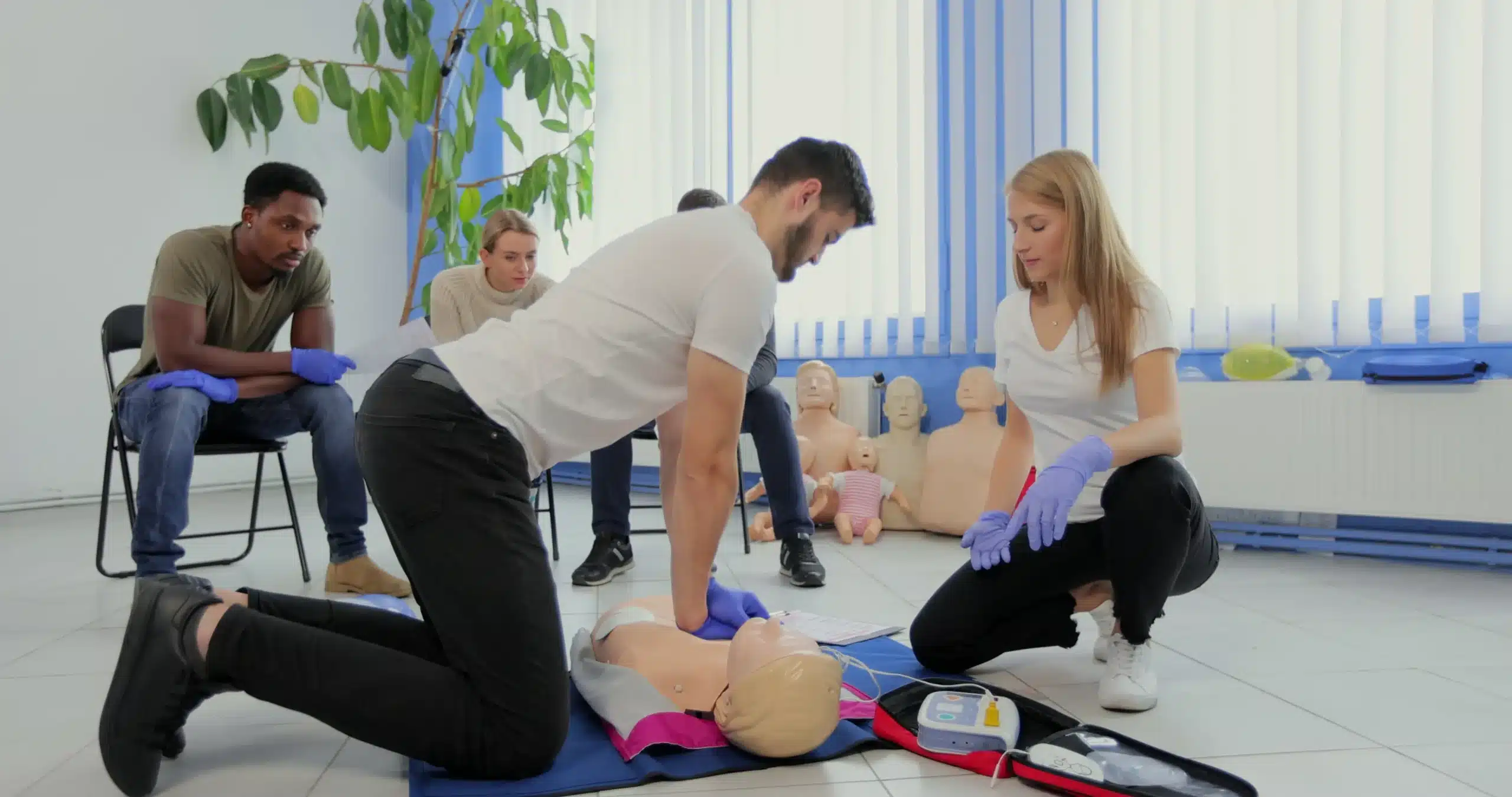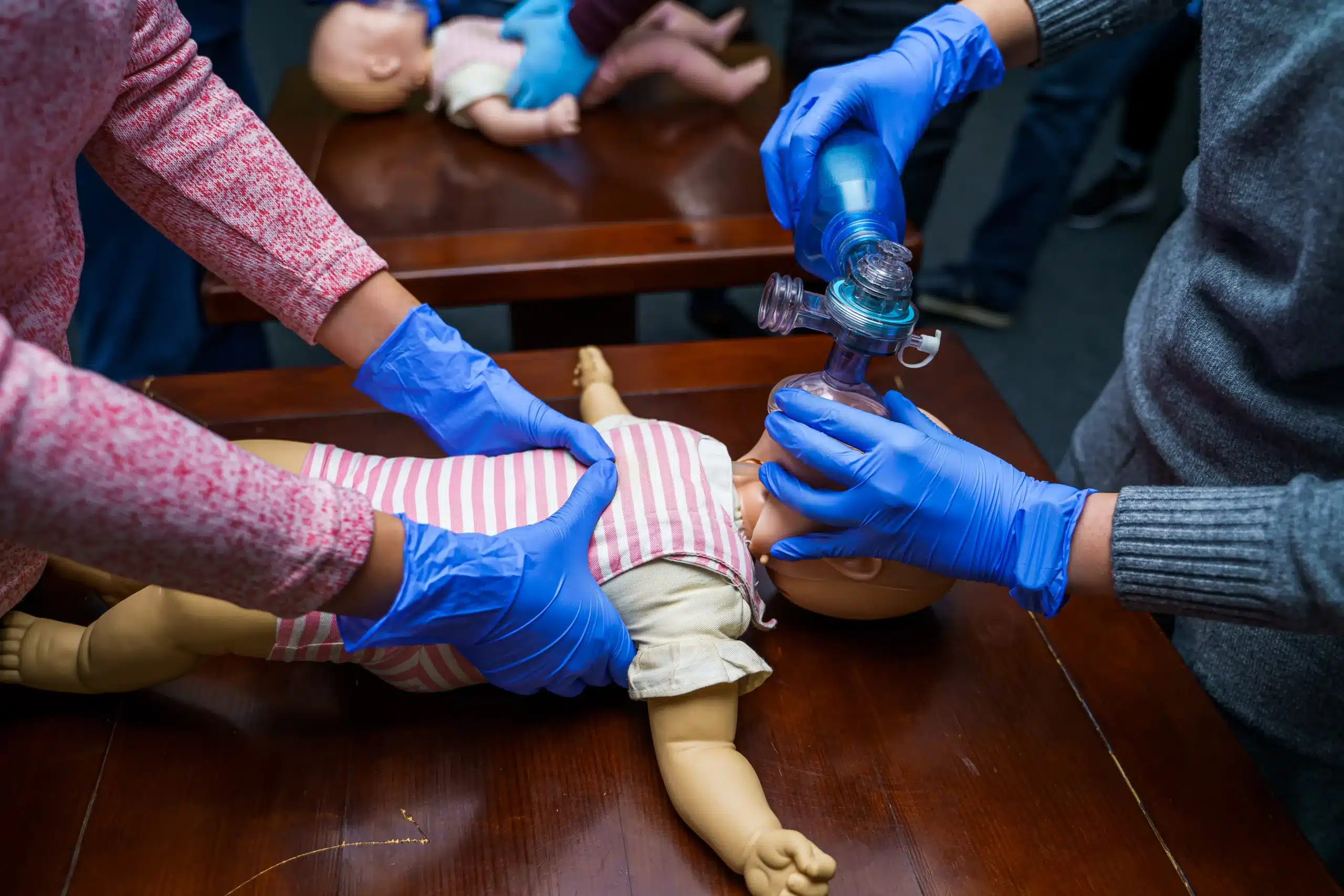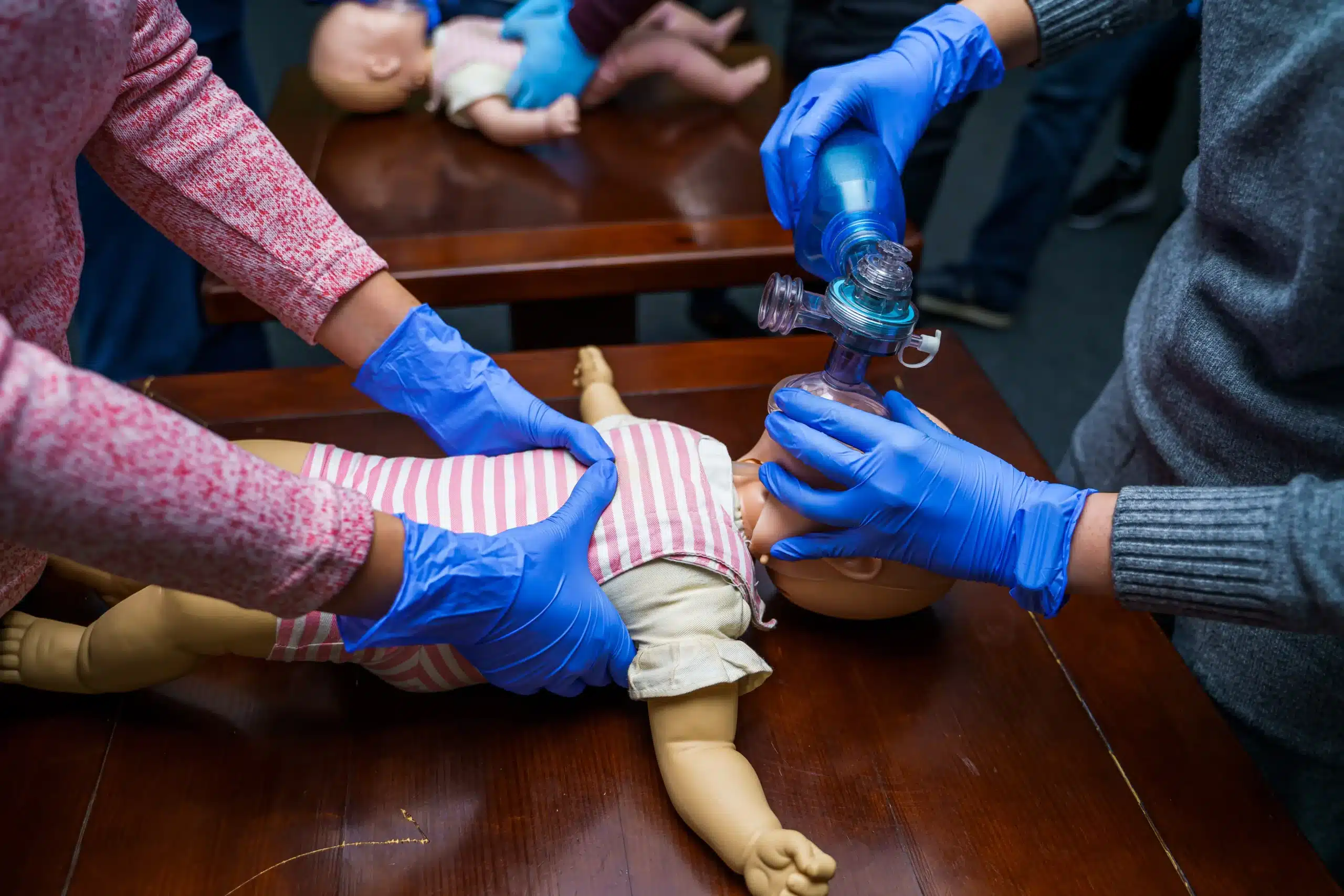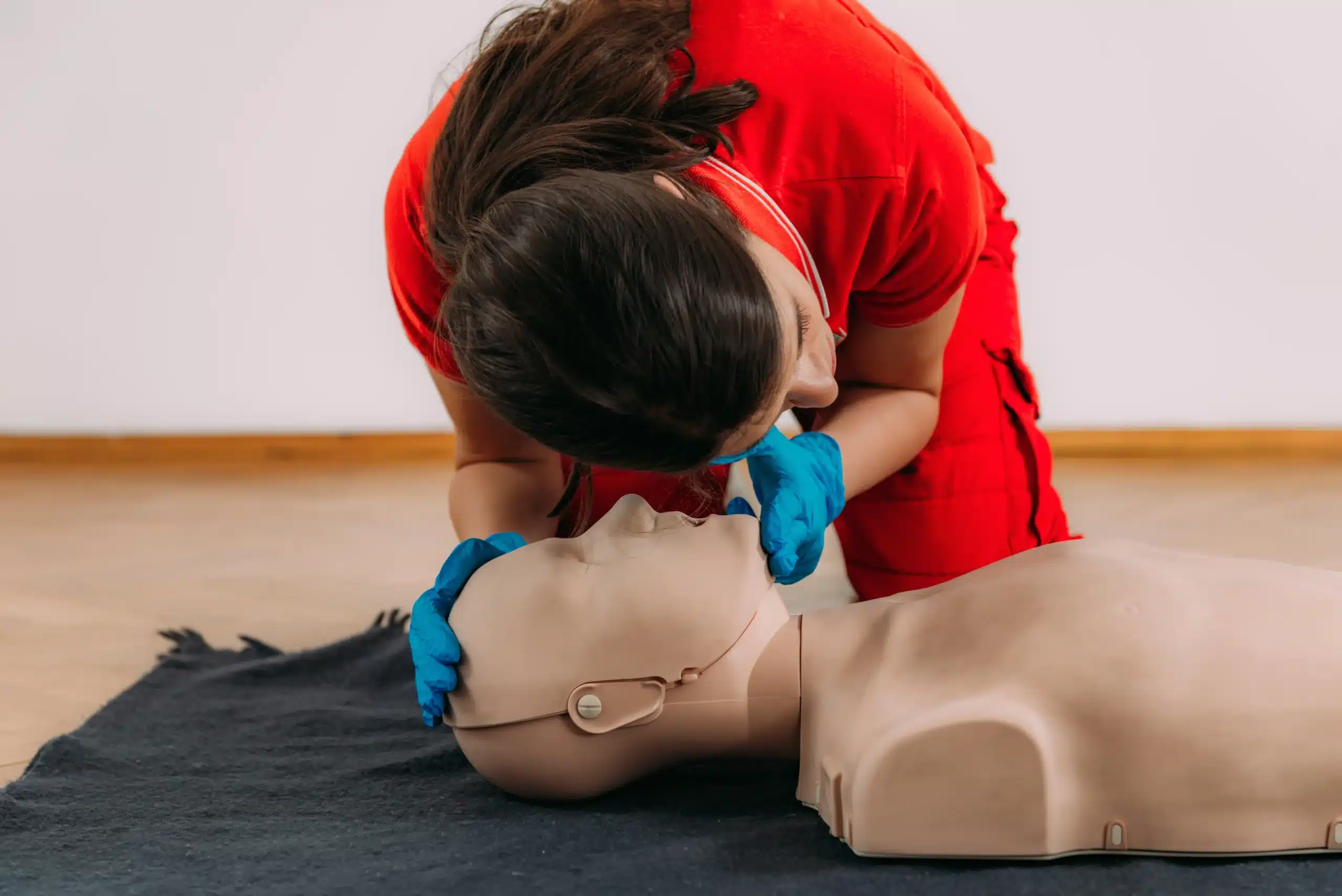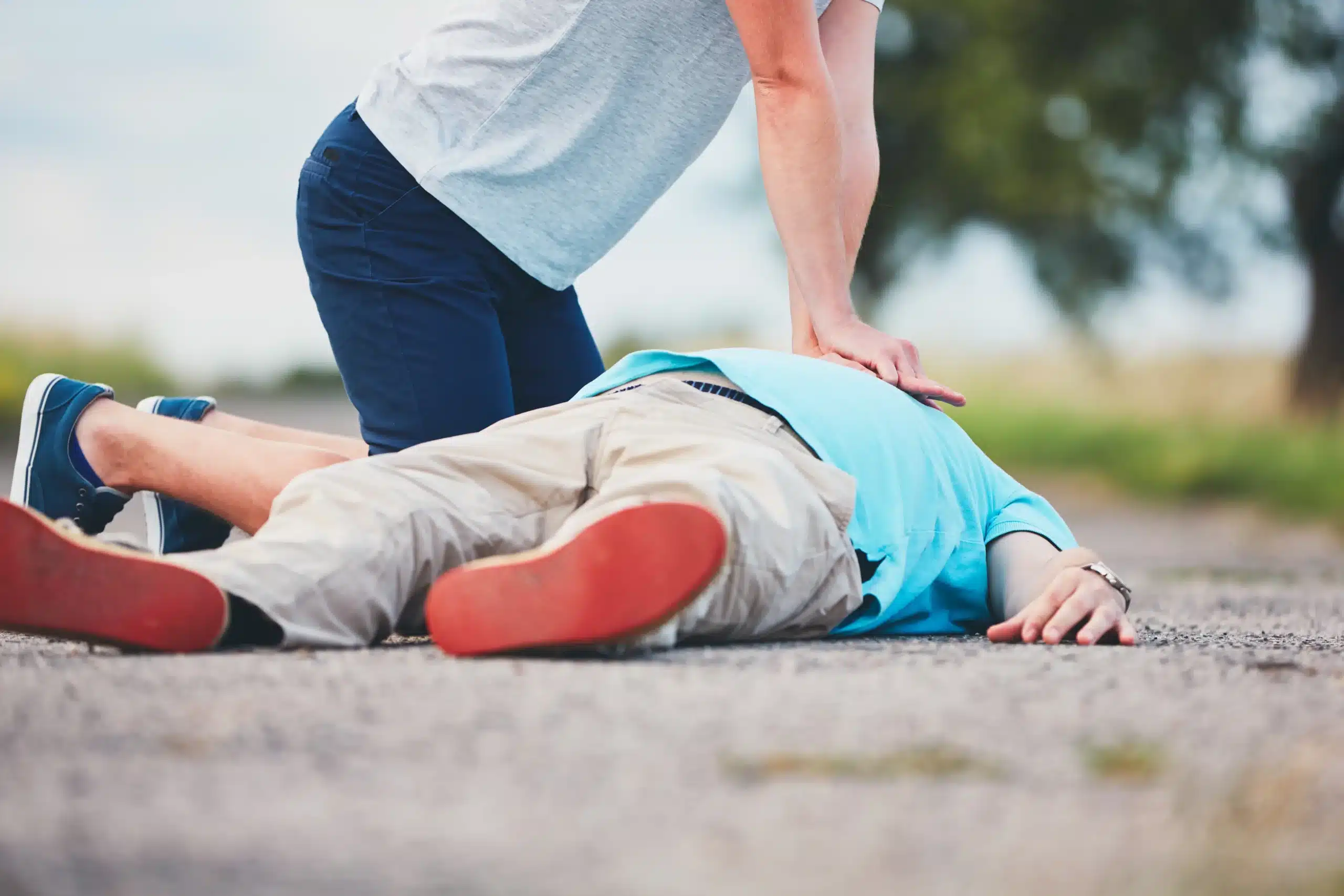Working in healthcare, you know that seconds can matter in a crisis. Whether you’re a seasoned professional or just starting your journey, having rock-solid Basic Life Support (BLS) skills is non-negotiable. This isn’t just about checking a box for your job—it’s about being ready to make a real difference when it matters most. This guide breaks down everything you need to know about BLS for healthcare providers in Merced, from where to find the best training to what to expect during the course. We’ll cover key skills, certification details, and how staying up-to-date with your BLS training can significantly impact patient outcomes. Let’s get you prepared to handle any emergency with confidence.
Key Takeaways
- BLS certification equips healthcare providers with essential skills: From CPR and AED use to airway management, these skills are crucial for effective emergency response and directly impact patient outcomes. Find a course that suits your needs and learning preferences.
- Select your BLS training carefully: Opt for an AHA-accredited program with experienced instructors, current materials, and hands-on practice. Consider factors like cost, schedule, and course format (in-person or blended) when making your choice.
- Maintaining BLS skills requires ongoing effort: Renew your certification every two years and incorporate regular practice to keep your skills sharp. Continuing education will ensure you stay informed about the latest guidelines and advancements in BLS.
What is BLS for Healthcare Providers?
BLS for Healthcare Providers is a critical course designed to equip medical professionals with the skills to respond effectively during life-threatening emergencies. This training covers a range of techniques essential for delivering immediate care and improving patient outcomes.
Definition and Importance
BLS certification is crucial for healthcare professionals like doctors, nurses, and EMTs. It provides the foundational knowledge and skills to manage cardiopulmonary arrest and other emergencies. These situations demand quick, decisive action, and BLS training ensures providers can confidently administer appropriate care. Understanding the facts about BLS is essential, as these skills are often applied in diverse and high-pressure environments. BLS equips providers to stabilize patients until more advanced medical help arrives. This immediate intervention can significantly impact a patient’s chances of survival and recovery. For healthcare providers, BLS certification isn’t just a credential—it’s a core competency that directly affects patient care. Learn more about the importance of BLS Certification.
Key Skills and Techniques
BLS training covers a range of life-saving techniques. Participants learn how to perform high-quality CPR, including chest compressions and rescue breaths, for adults, children, and infants. The course covers updated protocols from the American Heart Association. The curriculum also includes using automated external defibrillators (AEDs) to restore normal heart rhythm and basic airway management techniques to ensure adequate ventilation. Additionally, BLS training addresses how to assist someone who is choking, a critical skill for any healthcare provider. Common misconceptions about BLS are debunked here.
Essential Components
Basic Life Support training emphasizes early recognition and intervention in medical emergencies. It teaches healthcare professionals how to quickly assess a patient’s condition, identify life-threatening issues, and initiate appropriate treatment. BLS also stresses the importance of teamwork and communication during emergencies. Effective collaboration among healthcare providers is crucial for coordinating care and ensuring the best possible outcome for the patient. BLS training is essential for healthcare professionals.
Find BLS Certification in Merced
Finding the right BLS certification course in Merced doesn’t have to be a headache. Several excellent options cater to different learning styles and schedules. Let’s explore some of the leading providers in the area.
Merced CPR Classes
If convenience and affordability are top priorities, check out Merced CPR Classes. They offer a comprehensive range of American Heart Association (AHA) courses, including BLS, ACLS, PALS, and First Aid. With classes offered every day of the week and a low-price guarantee, they make high-quality training accessible to everyone. They even offer discounts for group classes, making it a great option for workplaces or groups of friends. Review their course prep materials before your class to get a head start.
First Lady Permanente
First Lady Permanente is another reputable option for BLS certification in Merced. As an AHA Training Center, they provide a variety of courses, from basic CPR and First Aid to advanced certifications like BLS, ACLS, and PALS. Their comprehensive approach ensures healthcare providers gain the skills and confidence to handle various emergency situations.
Safety Training Seminars
Safety Training Seminars stands out for its innovative approach to BLS training. In addition to traditional AHA BLS courses, they offer the RQI program—a streamlined and efficient way to get certified. RQI focuses on hands-on practice and real-time feedback, making it a perfect fit for busy professionals who need to refresh their skills quickly. They also offer ACLS courses.
Local Hospitals and Community Colleges
Don’t overlook the resources available through local hospitals and community colleges. These institutions often offer BLS certification courses designed specifically for healthcare providers. Check with hospitals like Mercy Medical Center Merced and community colleges like Merced College for their course schedules and offerings. These local options can be a cost-effective way to meet your certification requirements while connecting with other professionals in your area.
BLS Certification: Cost & Value
Getting BLS certified is an investment in your skills and ability to respond to medical emergencies. Understanding the associated costs and the value it provides helps you make informed decisions.
Standard Pricing & Textbooks
BLS certification courses typically cost around $70. This usually covers instruction, skills practice, and the certification assessment. You’ll also need an American Heart Association (AHA) BLS Provider Manual. Some providers include the manual in the course fee, while others may charge an additional fee (around $25) if you don’t bring your own. Check with your chosen training center for their specific pricing. Having the most up-to-date manual (currently the 2020 edition) ensures you’re learning the latest guidelines. Merced CPR Classes offers the AHA BLS Provider Manual.
Group & Student Discounts
Many training centers offer discounts for group registrations, making it cost-effective for workplaces or groups of friends. Group discounts can significantly lower the per-person cost. Some providers, like First Lady Permanente, also offer student discounts. Inquire about potential cost savings if you’re enrolled in a healthcare program. These discounts make BLS training more accessible for those starting medical careers.
Low-Cost Community Resources
Explore community resources that may offer lower-cost BLS training. Merced CPR Classes provides various courses, including BLS certification, at competitive prices, often with flexible scheduling. Also, check with local hospitals, community colleges, and non-profit organizations for discounted or free BLS training.
Training Materials Provided
When choosing a BLS course, confirm what training materials are included. Quality programs provide updated materials aligned with the latest AHA guidelines. Comprehensive BLS classes cover CPR techniques, AED use, and other critical skills, equipping you with the knowledge and confidence to respond effectively in emergencies.
Schedule & Course Formats for BLS
Finding the right BLS certification course often comes down to scheduling and format. Luckily, there are several options available to fit your needs. Whether you’re a busy healthcare professional or preparing for a new career, you can find a course that works for you. Merced CPR Classes offers courses seven days a week to accommodate various schedules.
Flexible Class Options & Duration
BLS certification courses are designed to be comprehensive, yet manageable. The duration can vary depending on the format you choose (in-person or blended learning) and your prior experience. Many providers offer weekend and evening classes, making it easier to fit training into your busy life. Check with specific providers like Merced CPR Classes for their course schedules and the typical time commitment involved.
In-Person vs. Blended Learning
Traditional in-person BLS courses provide hands-on training and direct interaction with instructors. This format allows for immediate feedback and personalized guidance. Blended learning combines online coursework with an in-person skills session. This option offers flexibility for those who prefer to learn at their own pace online before practicing skills in person. Safety Training Seminars offers both in-person and blended learning options.
Online Course Components
If you choose a blended learning format, the online portion typically covers the cognitive aspects of BLS. This includes learning about CPR protocols, using an AED, and recognizing the signs of a cardiac emergency. Heart Code Complete is one example of an online course that prepares students for their in-person skills session. This online component allows you to absorb the information at your own speed and review materials as needed.
Register for a Course
Ready to get started? Registering for a BLS course is straightforward. Visit the Merced CPR Classes website to view their course calendar and choose a date and time that works for you. You can also find information about course fees, discount group classes, and any required materials. American Heart Association BLS courses cover essential protocols and the use of AEDs, ensuring you receive comprehensive training. Contact Merced CPR Classes directly if you have any questions about the registration process or course content. Preparing for your course? Review the course prep page for helpful information and take advantage of their low price guarantee.
What to Expect During BLS Training
Attending a BLS course is more than just a checkbox for healthcare providers—it’s an empowering experience. Here’s what you can expect from your BLS training in Merced:
Course Structure & Content
BLS training follows American Heart Association (AHA) guidelines, covering essential life-saving techniques. Expect a comprehensive curriculum including high-quality CPR, AED use, and the latest protocols for various emergencies. Merced CPR classes offer training aligned with these updated AHA guidelines, ensuring you receive the most current information.
Hands-on Practice & Exams
BLS courses aren’t just lectures. You’ll actively participate in hands-on training sessions, practicing skills like chest compressions, rescue breaths, and AED operation. These practical exercises build muscle memory and confidence, preparing you to respond effectively under pressure. Real-world scenarios are integrated into the training, allowing you to apply your knowledge in simulated emergencies. Evaluations typically include a written exam and skills tests to assess your understanding and proficiency.
Instructor Expertise & Real-World Scenarios
Your instructors will be experienced, certified professionals dedicated to providing high-quality training. Safety Training Seminars, a woman-owned AHA Training Center in Merced, offers courses taught by experts who understand the demands of real-world emergencies. They create a supportive learning environment where you can ask questions and receive personalized feedback.
Certification Process & Validity
Upon successful completion of the course and exams, you’ll receive an AHA BLS Provider certification card. This nationally recognized credential validates your skills and knowledge in basic life support. The AHA RQI program offers a streamlined path to certification for medical professionals in Merced, making it easier to stay current with your credentials. Your BLS certification is typically valid for two years, after which you’ll need to complete a renewal course to maintain your skills and credentials.
Maintain Your BLS Certification
Once you’ve earned your BLS for Healthcare Providers certification, staying current is crucial for providing effective, high-quality patient care. Regular renewal, consistent practice, and continuing education ensure your skills remain sharp and aligned with the latest guidelines.
Renewal Requirements & Process
BLS certification requires renewal every two years. This ensures healthcare providers stay updated on the latest advancements and techniques in cardiopulmonary resuscitation. The renewal process typically involves completing a refresher course, either in person or through a blended learning format. Check with your certifying organization, such as the American Heart Association, for specific renewal requirements and approved training centers like Merced CPR Classes. Planning ahead prevents any lapse in your certification and keeps you prepared for emergencies.
Importance of Regular Practice
Even with a current certification, regular practice is essential to maintain proficiency in BLS skills. Consistent practice reinforces muscle memory and quick thinking. Practicing key techniques like chest compressions, rescue breaths, and using an AED can significantly impact your response time and effectiveness in a real-life emergency. Consider incorporating practice scenarios into your workplace training or joining refresher sessions offered by providers like Merced CPR Classes. This hands-on practice reinforces the information you learned during your initial certification and builds confidence.
Continuing Education
The field of healthcare is constantly evolving. New research and best practices emerge regularly, impacting how BLS is performed. Continuing education through workshops, online modules, or conferences keeps you informed about these advancements. Staying abreast of updates to the guidelines, such as those published by the International Liaison Committee on Resuscitation (ILCOR), ensures you’re providing the most effective care. Continuing education demonstrates your commitment to professional development and strengthens your understanding of BLS principles. Consider exploring resources like the BLS Handbook to stay informed.
Choose the Right BLS Training
Finding the right BLS training course is crucial for both your confidence and your career. Here’s what to consider when making your decision:
Accreditation & Certification Standards
Look for training centers offering American Heart Association (AHA) BLS CPR classes. AHA courses are comprehensive, covering updated protocols for high-quality CPR and AED use. This ensures you receive a recognized and respected certification.
Instructor Qualifications
Experienced, certified instructors make all the difference. Safety Training Seminars, an AHA Training Center, provides top-notch instruction for BLS, ACLS, PALS, CPR, and First Aid courses in Merced. Knowing your instructor has the right credentials ensures you’re learning from the best.
Facility & Equipment Quality
Modern equipment and a comfortable learning environment contribute to a positive training experience. The AHA’s Resuscitation Quality Improvement (RQI) program is a popular and efficient way for healthcare professionals to pursue their BLS, ACLS, and PALS certifications. RQI programs often feature up-to-date equipment and facilities.
Flexible Learning Options
Busy schedules shouldn’t be a barrier to training. Explore programs with flexible learning options, such as blended learning. HeartCode Complete offers an online portion you can complete at your own pace, followed by a live, in-person skills session. This combination allows you to fit training into your life more easily.
BLS Training Policies
Understanding the policies surrounding your BLS training is just as important as the training itself. This helps ensure a smooth and successful learning experience. Here’s a breakdown of key policies to keep in mind:
Enrollment Prerequisites
Before you sign up for a BLS for Healthcare Providers renewal course, make sure you have a current American Heart Association (AHA) BLS Provider card. This prerequisite ensures everyone in the class has a solid foundation in BLS principles. Check your card’s expiration date and plan accordingly. For more information about our BLS courses, visit our BLS page.
Cancellation & Rescheduling
We understand that sometimes you need to change your plans. While we have a strict no-refund policy (except for documented medical emergencies), we do offer options for rescheduling. A $25 fee applies if you reschedule with less than three business days’ notice. Arriving more than 10 minutes late to class also requires rescheduling and the $25 fee. For tips on preparing for your class, visit our course preparation page.
Guideline Updates
The guidelines for CPR and Emergency Cardiac Care (ECC) are periodically updated by the International Liaison Committee on Resuscitation (ILCOR). These updates reflect the latest scientific evidence and best practices, typically occurring every five years. The current guidelines, released in 2020, remain in effect until the next update. Staying current with these guidelines is vital for healthcare providers. Learn more about our commitment to affordable training on our low price guarantee page.
The Impact of BLS Training
BLS training goes beyond simply learning techniques; it creates a ripple effect that positively impacts patient care, team dynamics, and individual provider confidence. Let’s explore some of the key benefits:
Improve Patient Outcomes
BLS for healthcare providers plays a crucial role in improving patient outcomes. Equipping medical professionals with these skills empowers them to respond effectively during emergencies. Effective BLS intervention can significantly improve survival rates and enhance the chances of a full recovery for patients experiencing cardiac arrest or other life-threatening events. This makes BLS certification a cornerstone of quality patient care. For more on the importance of BLS, see this article on BLS for healthcare providers.
Enhance Emergency Team Dynamics
Beyond individual skills, BLS training fosters effective teamwork during emergencies. A shared understanding of protocols and procedures streamlines communication and coordination among healthcare providers. This coordinated response creates a more efficient and effective approach to critical situations, ultimately benefiting the patient. When every team member knows their role and can execute it confidently, the entire team functions more smoothly under pressure. Learn more about the importance of training by exploring these CPR and BLS classes.
Build Confidence in Critical Situations
Comprehensive BLS courses often incorporate hands-on training and real-world scenarios. This immersive approach not only equips participants with the necessary skills but also cultivates confidence in their ability to apply them effectively. Knowing how to react decisively in a high-pressure situation can make all the difference. This confidence translates to quicker, more effective interventions, leading to better patient outcomes and a more positive work experience for the provider. Consider checking out these BLS courses to learn more.
Related Articles
- BLS Courses in Atwater: Your Guide – Merced CPR Classes
- ACLS Courses in Merced: Find the Right One For You – Merced CPR Classes
- BLS Classes in Atwater: Your Certification Guide – Merced CPR Classes
- HeartCode BLS Atwater: Your Guide to Online CPR Training – Merced CPR Classes
- BLS ACLS Classes in Merced CA: Your Guide – Merced CPR Classes
Frequently Asked Questions
Why is BLS certification important for healthcare providers? It’s a fundamental requirement for most healthcare roles because it equips professionals with the skills to manage life-threatening emergencies like cardiac arrest. These skills are essential for stabilizing patients until advanced medical help arrives, directly impacting patient survival and recovery.
What key skills are taught in a BLS course? You’ll learn how to perform high-quality CPR for adults, children, and infants, use an AED, manage airways, and relieve choking. The course covers the latest American Heart Association protocols, ensuring you’re up-to-date on the most effective techniques.
How do I find a BLS certification course in Merced? Several providers offer BLS certification in Merced. Merced CPR Classes is a convenient and affordable option with a low-price guarantee. First Lady Permanente and Safety Training Seminars are also reputable providers. You can also check with local hospitals and community colleges for courses.
How much does BLS certification cost, and are there any discounts available? BLS courses typically cost around $70, which may or may not include the AHA BLS Provider Manual. Many providers offer discounts for group registrations and students. Check with your chosen training center for specific pricing and available discounts. Also, explore community resources for potential low-cost options.
What can I expect during a BLS training course? Expect a blend of instruction, hands-on practice, and evaluation. You’ll actively participate in scenarios, practicing CPR, AED use, and other essential skills. Instructors provide feedback and guidance. You’ll likely have a written exam and skills tests to earn your certification.

